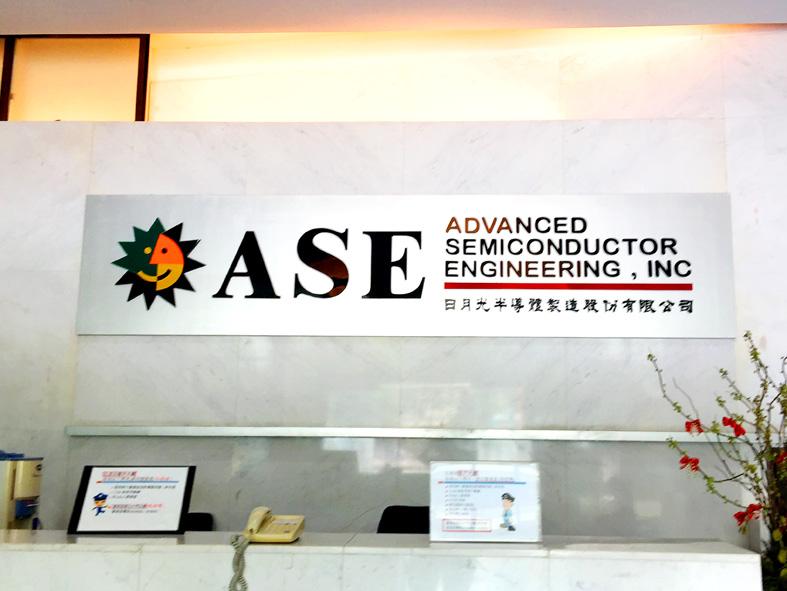ASE Technology Holding Co’s (日月光投控) proposed sale of some Chinese subsidiaries is expected to affect its overall revenue in the near term, but would help optimize its product portfolio in the long term, analysts said last week.
ASE is the world’s largest chip packaging and testing company. Its products include wire bonding, flip chip, system-in-package (SiP) solutions and broad-based electronics manufacturing services.
The company on Wednesday announced that it is planning to sell its shares in Global Advanced Packaging Test (Hong Kong) Ltd, ASE (Weihai) Inc (日月光半導體威海), Suzhou ASEN Semiconductors Co Ltd (蘇州日月新半導體), ASE Advanced Semiconductor (Shanghai) Ltd (上海日榮半導體), ASE (Kunshan) Inc (昆山日月光半導體) and Beijing Wise Road Asset Management Co Ltd (北京智路資產管理).

Photo: Grace Hung, Taipei Times
The Kaohsiung-based firm said the stock to be sold totals US$1.46 billion and it expects to book about US$630 million in divestment gains from the divestment.
The Kunshan, Suzhou and Shanghai subsidiaries mainly produce wire bonding, and offer packaging and testing services, while the Weihai plant focuses on discrete component manufacturing, Yuanta Securities Investment Consulting Co (元大投顧) analysts said in a research note on Friday.
“The sale of those facilities will cost about 7 to 8 percent of the company’s packaging and testing revenue, and it is expected to have an impact of about 4 to 5 percent on its overall revenue initially,” Yuanta analysts said.
After the proposed divestment, ASE’s operations in China would be Siliconware Technology (Suzhou) Ltd (矽品蘇州), ASE Shanghai Material (日月光上海材料) and ASE Wuxi (日月光無錫), with the remaining Suzhou subsidiary accounting for about 8 percent of the firm’s packaging and testing revenue, the analysts said.
ASE Technology is planning to invest in its operations in Taiwan and the Suzhou subsidiary, which offers high-end packaging and applications, they said, calling the move “conducive to the development of production capacity and technology.”
“ASE will continue to strengthen high-end packaging and testing technology and production capacity, which will help optimize its overall product portfolio,” they said.
The company is seeking to develop advanced chip packaging and testing services covering power management, radio frequency, automotive, mobile phone and SiP chips, the analysts added.
Yuanta said that ASE Technology is likely to see stronger-than-expected demand in the first quarter of next year, the traditional low season, as product specification upgrades would increase packaging requirements and testing procedures.
The firm’s business would also be boosted by clients of its broad-based electronics manufacturing services that have postponed orders this quarter due to component shortages, the analysts said.
“Packaging and testing capacity will still be in short supply in 2022, and the increase in silicon content in electronic devices will benefit the demand for semiconductors, which will benefit ASE’s capacity utilization rate and product mix,” Yuanta analysts said.
The company’s shares closed at NT$109 in Taipei on Friday, up 3.81 percent from the previous session.
Its stock price has increased 34.07 percent so far this year, compared with the broader market’s 20.12 percent rise.

Shares in Taiwan closed at a new high yesterday, the first trading day of the new year, as contract chipmaker Taiwan Semiconductor Manufacturing Co (TSMC, 台積電) continued to break records amid an artificial intelligence (AI) boom, dealers said. The TAIEX closed up 386.21 points, or 1.33 percent, at 29,349.81, with turnover totaling NT$648.844 billion (US$20.65 billion). “Judging from a stronger Taiwan dollar against the US dollar, I think foreign institutional investors returned from the holidays and brought funds into the local market,” Concord Securities Co (康和證券) analyst Kerry Huang (黃志祺) said. “Foreign investors just rebuilt their positions with TSMC as their top target,

REVENUE PERFORMANCE: Cloud and network products, and electronic components saw strong increases, while smart consumer electronics and computing products fell Hon Hai Precision Industry Co (鴻海精密) yesterday posted 26.51 percent quarterly growth in revenue for last quarter to NT$2.6 trillion (US$82.44 billion), the strongest on record for the period and above expectations, but the company forecast a slight revenue dip this quarter due to seasonal factors. On an annual basis, revenue last quarter grew 22.07 percent, the company said. Analysts on average estimated about NT$2.4 trillion increase. Hon Hai, which assembles servers for Nvidia Corp and iPhones for Apple Inc, is expanding its capacity in the US, adding artificial intelligence (AI) server production in Wisconsin and Texas, where it operates established campuses. This

US President Donald Trump on Friday blocked US photonics firm HieFo Corp’s US$3 million acquisition of assets in New Jersey-based aerospace and defense specialist Emcore Corp, citing national security and China-related concerns. In an order released by the White House, Trump said HieFo was “controlled by a citizen of the People’s Republic of China” and that its 2024 acquisition of Emcore’s businesses led the US president to believe that it might “take action that threatens to impair the national security of the United States.” The order did not name the person or detail Trump’s concerns. “The Transaction is hereby prohibited,”

Garment maker Makalot Industrial Co (聚陽) yesterday reported lower-than-expected fourth-quarter revenue of NT$7.93 billion (US$251.44 million), down 9.48 percent from NT$8.76 billion a year earlier. On a quarterly basis, revenue fell 10.83 percent from NT$8.89 billion, company data showed. The figure was also lower than market expectations of NT$8.05 billion, according to data compiled by Yuanta Securities Investment and Consulting Co (元大投顧), which had projected NT$8.22 billion. Makalot’s revenue this quarter would likely increase by a mid-teens percentage as the industry is entering its high season, Yuanta said. Overall, Makalot’s revenue last year totaled NT$34.43 billion, down 3.08 percent from its record NT$35.52